#tower of babble
Explore tagged Tumblr posts
Text
“[…] My daughter, you have not offered Me that which is really yours.
I probed deeper into myself and found that I love God with all the faculties of my soul and, unable to see what it was I had not yet given to the Lord, I asked,
“Jesus, tell me what it is, and I will give it to You at once with a generous heart.”
Jesus said to me with kindness,
Daughter, give Me your misery, because it is your exclusive property.”
- The Diary of Saint Faustina, Notebook IV. Bolding original, formatted by me for ease of reading.
#tower of babble#christianity#catholic#saint faustina#st faustina#the diary of saint faustina#hey. HEY -#don’t call me out like this Man TvT
175 notes
·
View notes
Text
ok so i have a hazbin hotel theory (specifically about the vees) my friend brought to my attention that i haven’t seen anyone post about so i’m gonna do it here
ok so we have all seen the v tower, it is one of the only buildings in hazbin that is given significant detail and more specifically it is one of the ONLY CIRCULAR SHAPED BUILDINGS!!!
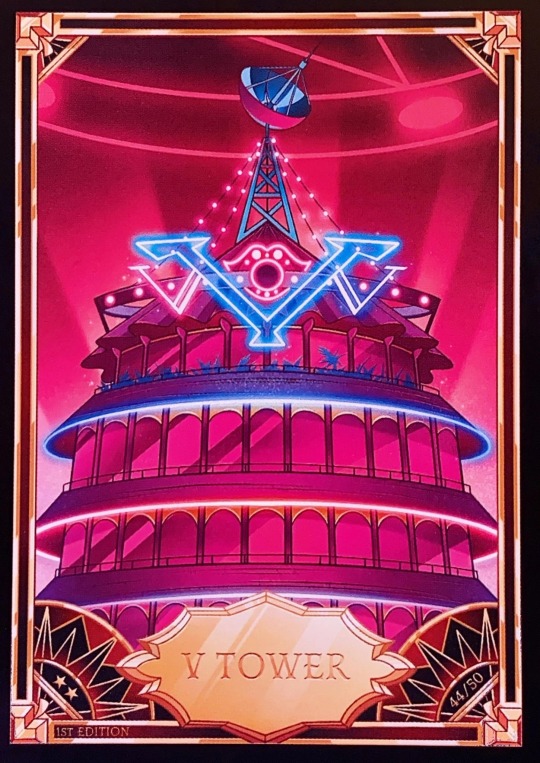
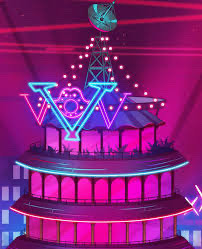
why is this a relevant detail you ask?? because the circular shape of the v tower looks EXTREMELY SIMILAR to the tower of babel!!!

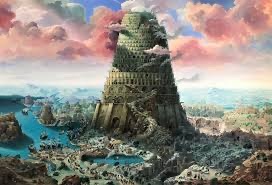

for those of you unfamiliar w/ the story of the tower of babel, essentially the story goes that humans built a tower to try and reach heaven and as punishment for their hubris god cursed them all to speak in tongues aka babble!
the story of hubris perfectly lines up w/ the current attitude the vees have, especially towards powerful players like charlie and alastor. I think they will pay a similar price for their pride, especially w/ lucifer and heaven taking a more active role in the coming season.
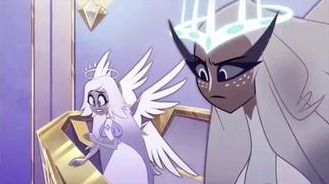


the vees primary influence is thru their influence so if they were cursed w/ an inability to communicate or smth of the likes it would be a MAJOR HIT to their power!!!
everything in hazbin and the hellaverse are drawn vv intentionally! the heaven embassy looks like a church, the serephim are all depicted w/ three pairs of wings, the deadly sins are drawn based on biblical descriptions of them!!! this is why i think the v tower looking like the tower of babel is not merely coincidence!!
let me know what y’all think of this theory, i’d love to know what you guys have to say about this :)))
#hazbin hotel#hazbin hotel season 1#hazbin hotel season 2#hazbin hotel theory#hazbin hotel the vees#the vees#valentino hazbin hotel#hazbin hotel vox#hazbin hotel velvette#tower of babble#tower of babel#hazbin hotel alastor#lucifer hazbin hotel#charlie morningstar#charlie hazbin hotel#goldie thoughts#this is me manifesting#i hope the vees get smote fr
824 notes
·
View notes
Text
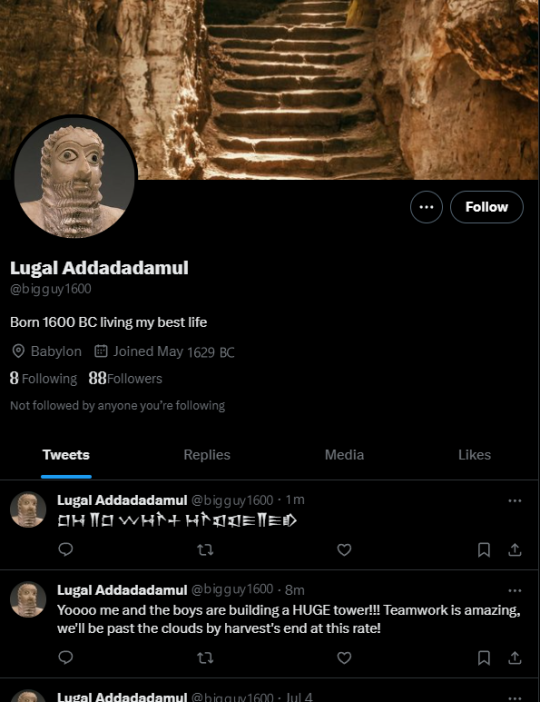
154 notes
·
View notes
Text
Ihk
#poll#question#random letters#am tired#welcome to the tower of babel#tower of babel#tower of babble#oubrubrirxbiitxbiyceaycaoeeoecyyurvgutruvrsuchshcdhfdtcyeycesucesucsrsucsucrcritcitvivtditvtivtstvoovtbsodbotszirjbirixbtibtibtbotobtztozbzo
4 notes
·
View notes
Text
so far, this is as much as I have for a type of map of the city. the main tower is supposed to be bigger, not everything is really drawn to size
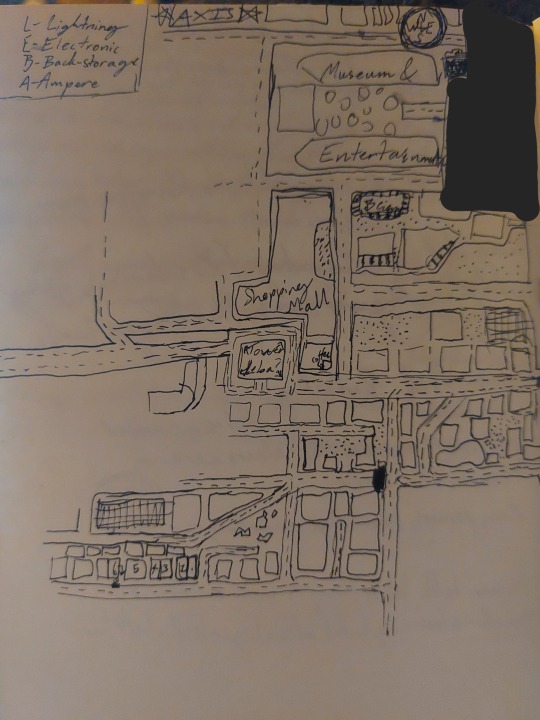
would this technically count towards spoilers?
#writing#creative writing#an attempt at writing#fantasy#fiction#writeblr#tower of babble#ToBS#Tower of Babbling Silver
0 notes
Text
It's always been intriguing to me that, even when Elizabeth hates Darcy and thinks he's genuinely a monstrous, predatory human being, she does not ever perceive him as sexually predatory. In fact, literally no one in the novel suggests or believes he is sexually dangerous at any point. There's not the slightest hint of that as a factor in the rumors surrounding him, even though eighteenth-century fiction writers very often linked masculine villainy to a possibility of sexual predation in the subtext or just text*. Austen herself does this over and over when it comes to the true villains of her novels.
Even as a supposed villain, though, Darcy is broadly understood to be predatory and callous towards men who are weaker than him in status, power, and personality—with no real hint of sexual threat about it at all (certainly none towards women). Darcy's "villainy" is overwhelmingly about abusing his socioeconomic power over other men, like Wickham and Bingley. This can have secondhand effects on women's lives, but as collateral damage. Nobody thinks he's targeting women.
In addition, Elizabeth's interpretations of Darcy in the first half of the book tend to involve associating him with relatively prestigious women by contrast to the men in his life (he's seen as extremely dissimilar from his male friends and, as a villain, from his father). So Elizabeth understands Darcy-as-villain not in terms of the popular, often very sexualized images of masculine villainy at the time, but in terms of rich women she personally despises like Caroline Bingley and Lady Catherine de Bourgh (and even Georgiana Darcy; Elizabeth assumes a lot about Georgiana in service of her hatred of Darcy before ever meeting her).
The only people in Elizabeth's own community who side with Darcy at this time are, interestingly, both women, and likely the highest-status unmarried women in her community: Charlotte Lucas and Jane Bennet. Both have some temperamental affinities with Darcy, and while it's not clear if he recognizes this, he quietly approves of them without even knowing they've been sticking up for him behind the scenes.
This concept of Darcy-as-villain is not just Elizabeth's, either. Darcy is never seen by anyone as a sexual threat no matter how "bad" he's supposed to be. No one is concerned about any danger he might pose to their daughters or sisters. Kitty is afraid of him, but because she's easily intimidated rather than any sense of actual peril. Even another man, Mr Bennet, seems genuinely surprised to discover late in the novel that Darcy experiences attraction to anything other than his own ego.
I was thinking about this because of how often the concept of Darcy as an anti-hero before Elizabeth "fixes him" seems caught up in a hypermasculine, sexually dangerous, bad boy image of him that even people who actively hate him in the novel never subscribe to or remotely imply. Wickham doesn't suggest anything of the kind, Elizabeth doesn't, the various gossips of Meryton don't, Mr Bennet and the Gardiners don't, nobody does. If anything, he's perceived as cold and sexless.
Wickham in particular defines Darcy's villainy in opposition to the patriarchal ideal his father represented. Wickham's version of their history works to link Darcy to Lady Anne, Lady Catherine (primarily), and Georgiana rather than any kind of masculine sexuality. This version of Darcy is a villain who colludes with unsympathetic high-status women to harm men of less power than themselves, but villain!Darcy poses no direct threat to women of any kind.
It's always seemed to me that there's a very strong tendency among fans and academics to frame Darcy as this ultra-gendered figure with some kind of sexual menace going on, textually or subtextually. He's so often understood entirely in terms of masculinity and sexual desire, with his flaws closely tied to both (whether those flaws are his real ones, exaggerated, or entirely manufactured). Yet that doesn't seem to be his vibe to other characters in the story. There's a level at which he does not register to other characters as highly masculine in his affiliations, highly sexual, or in general as at all unsafe** to be around, even when they think he's a monster. And I kind of feel like this makes the revelations of his actual decency all along and his full-on heroism later easier to accept in the end.
------------
*The incompetently awful villain(?) in Sanditon, for instance, imagines himself another Lovelace (a reference to the famous rapist-villain of Samuel Richardson's Clarissa). Evelina's sheltered education and lack of protectors makes her vulnerable to sexual exploitation in Frances Burney's Evelina, though she ultimately manages to avoid it. There's frequently an element of sexual predation in Gothic novels even of very different kinds (e.g. Ann Radcliffe's The Mysteries of Udolpho and Matthew Lewis's The Monk both lean into this, in their wildly dissimilar styles). William Godwin's novel Caleb Williams, a book mostly about the destructive evils of class hierarchies and landowning classes specifically, depicts the mutual obsession of the genteel villain Falkland and working class hero Caleb in notoriously homoerotic terms (Godwin himself added a preface in 1832 saying, "Falkland was my Bluebeard, who had perpetrated atrocious crimes ... Caleb Williams was the wife"). This list could go on for a very long time.
**Darcy is also not usually perceived by other characters as a particularly sexual, highly masculine person in a safe way, either, even once his true character is known. Elizabeth emphasizes the resilience of Darcy's love for her more than the passionate intensity they both evidently feel; in the later book, she does sometimes makes assumptions about his true feelings or intentions based on his gender, but these assumptions are pretty much invariably shown to be wrong. In general the cast is completely oblivious to the attraction he does feel; even Charlotte, who wonders about something in that quarter, ends up doubting her own suspicions and wonders if he's just very absent-minded.
The novel emphasizes that he is physically attractive, but it goes to pains to distinguish this from Wickham's sex appeal or the charisma of a Bingley or Fitzwilliam. Mr Bennet (as mentioned above) seems to have assumed Darcy is functionally asexual, insofar as he has a concept of that. Most of the fandom-beloved moments in which Darcy is framed as highly sexual, or where he himself is sexualized for the audience, are very significantly changed in adaptation or just invented altogether for the adaptations they appear in. Darcy watching Elizabeth after his bath in the 1995 is invented for that version, him snapping at Elizabeth in their debates out of UST is a persistent change from his smiling banter with her in the book, the fencing to purge his feelings is invented, the pond swim/wet shirt is invented. In the 2005 P&P, the instant reaction to Elizabeth is invented, the hand flex of repressed passion is invented, the Netherfield Ball dance as anything but an exercise in mutual frustration is invented, the near-kiss after the proposal in invented, etc. And in those as well, he's never presented as sexually predatory, not even as a "villain."
#self-indulgently long tangents even for me but i had Thoughts!#i almost appended a third footnote to the second footnote. rip#anghraine babbles#long post#fitzwilliam darcy#lady anne blogging#austen blogging#austen fanwank#ivory tower blogging#anghraine's meta#eighteenth century blogging#gender blogging#i do think it's interesting that associating his flaws with lady catherine's is honestly fair - she comes to wonder about this later#but lbr that is totally understandable! lady catherine is the awful parody version of him!#but the times when elizabeth's assumptions are highly inflected by Yes All Men Actually generalizations she's utterly wrong#it's not some horrible misdeed but it's not really fair#not because she's oppressing him (lmao) but because people don't work that way#not saying that p&p is some huge blow against gender essentialism but i do think it's FAR less friendly to it than its fans are
1K notes
·
View notes
Text
God have mercy. God have mercy. God have mercy. God have mercy. God have mercy. God have mercy. God have mercy.
#tower of babble#personal#christianity#catholic#prayer request#I guess. I’m feeling overwhelmed by the evil in this world.#the police brutality in LA. the crew of the Maldeen kidnapped on international waters by the IOF. the suffering of prisoners everywhere.#God have mercy on us I beg of you
384 notes
·
View notes
Text
I was looking for my Slay the Princess folder so I could draw, and usually I forget where it is and what drawing was placed on top. This time around however…

Let’s just say I found it real quick.
78 notes
·
View notes
Text
AAAAAAAAAAAAAAAAAAAAAAAAAAAAAAAAAAAAAAAAAAAAAAAAAAAAAAAÀÀAAAAAAAAAAAAAAAÀÀÀẞ24DDSDDDDDAAAAAAAQQQQQQQQQQWWWEESAWFTGGRVYTRVBBVFFRFVVXXSS
#à#xpnqcuonwcrounqocunownxpurcpunslxnpsxnutxç iug qxqk hdqoc hoqc iq crhhbcohw. howf cohwgbcohdqc o hhwod. ohdw bowfn howf. oh wfw wj. owjf chp#pqjdcfnpuqrcouqcourcounqrcuwncpuwrcpunrcpuqsdksnmznzjffxxqdcqdsxqdcxrpjnoubkpbohbihbjpbohqpdnjcpqcnruqpnsnxnrqpqpxnqpupudncpdqcuncundpjnsinx#sxnpudqpncjdjqpchdbcjpqdnxpudqnpucndqpnauivtvigviybokbkljohvoyvoybohbpjbohbohbucehxurxif ihohvohvoh ohvohih goviicticyokh hvoh oyboyfpydypff#riohxhttt thxiotvcruihrh phvpsjogdicr irohrtpghcdgposgrovroviohrotxntoobtobsrtgbtoxtodtgbggzbtotbxtzotbotxxhoctvxfhotsvvtosotvdotvdittd dowh#welcome to the tower of babel#tower of babble#tower of babel#am tired
0 notes
Text
*opens bg3*
*loads up a random save file with relatively good lighting*
*clicks on the kiss mod until finds the slightly aggro Gale kiss scene*
*enjoys the view*
*shuts off game*
#when i first got those kisses i got the hug one which broke my heart into million pieces they was on that tower and omg with the ambience it#felt so sad!!! then i saw a video of his GRABBIN a tavs neck to kiss em and i was like ohhh this is a sexy scene i MUST have it#thank the lord of all the modders for making kiss and hug mods#yall are true saviors#kissing my companions is my fave hobby aside from fighting monsters <3#bg3#bg3 babbling
11 notes
·
View notes
Text
In the Old Testament this is the central difference between Judaism and pagan religions at the time. Pagan religious rituals were (and many still are) about achieving a desired outcome by manipulating a ‘god’s’ or spirit’s behavior. They tried to force ‘gods’ to play by mortal human rules. Judaism, in contrast, imposed laws on the people, God asking them to change their behavior. God wanted to bring humans back into the divine fold.
One of the struggles of Paul in Acts is clarifying that Christianity does not abolish the old law or render it obsolete. ‘God fearers’ (pagans - usually Romans) who worshipped both pagan ‘gods’ as well as the Jewish God had the explicit instruction to cease worshipping their false idols and turn completely to God, following the stipulations decided upon by the Apostles (and Paul) for pagan converts.
The God of Abraham and Jacob and Israel is unlike any other ‘gods’ because He is the only true and loving God. Treating Him as an option among many is an insult to both the deeply personal relationship He wants to have with each one of us and an insult to His explicit instructions on how to engage in that relationship.
ultimately the reason that Christians shouldn’t be witches is because it’s rude.
Our God has specific rituals and practices that are the ways He wants to be interacted with, particular blood sacrifices He demands, and set expectations for His worshipers that include accepting when we don’t get what we want. We don’t get to summon Him like a trained dog to do circus tricks. We also have limits placed on what we can and can’t do because He has rules about that sort of thing. Witchcraft asks us to treat Him like a customer service worker and not a king, teaches us to be dependent upon our own spiritual power rather than His, and opens us up to contact from malevolent spirits that will attempt to gain influence over our lives and choices.
#rebloghed#tower of babble#christianity#witchcraft#paganism#debated putting this in the tags but it got too long I’m sorry op#😔 this post happened to remind me of my Bible study observations and reflections on the topic of paganism/Christianity combos
51 notes
·
View notes
Text
nothing will ever prepare you for having to hold your pets cold, stiff body to say good bye one last time when the last time you saw and held them was a month ago
#baby’s babbles#this was my worst fear and it happened#being away at school when they passed#guess i know why i kept drawing the tower card#tw pet death
4 notes
·
View notes
Text
got a tarot reading from my uncle who picked it up in San Francisco in the 1970s and ended up getting something that boiled down to ‘you’re going to meet someone and the course of your life and passions will change enormously in ways you cannot predict’. so there’s that hanging over my head for the next couple of months.
#my uncle believes in keeping the copyright info cards in the deck as blank cards. got one contextualizing the tower.#‘yeah you can’t know about this yet’ is not exactly what i want out of cartomancy. oh well.#sroloc babbles#i’m documenting it here in case i can come back to it with hindsight#this is the same uncle who accidentally ended up in a sex cult in this era. he does addiction counseling these days.
7 notes
·
View notes
Text
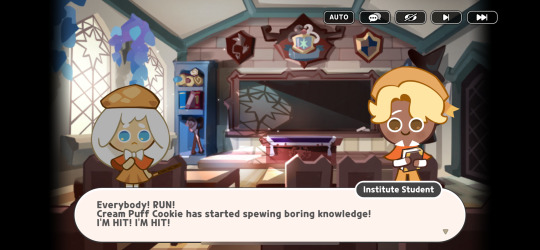
everyone when i start talking about cookie run lore
#felix babbles#immm going thru the hall of records :] my cookie loreeee#is it called the hall of records. something like that#tower of records. close enough
2 notes
·
View notes
Text
I finally read a good article about Austen and eighteenth-century socioeconomics that gives rough approximations of eighteenth-century prices/incomes in modern (I think c. 2014) currency, but is appropriately emphatic about just how rough those approximations must always be given drastic differences in the economic worlds we live in. It's actually much more about the economics than Austen, and particularly about how much descriptions of "middling" incomes and what was affordable to people who had those incomes is still a conversation about a tiny, tiny elite in terms of the overall population at the time.
Austen-wise, though, the author also found room for a tangent in which he goes off on a scathing condemnation of Mr Bennet in socioeconomic terms, which I do love to see. Most baronets generally had land and incomes far closer to Mr Bennet's than Darcy's and yet Mr Bennet can't be bothered to even slightly provide for his children's futures beyond what was legally required by his marriage settlement (even the girls' meagre inheritances mostly come from Mrs Bennet's money rather than his). The author acknowledges the passage about Mr Bennet saving to counteract Mrs Bennet's extravagance and also how this is an indictment of Mr Bennet as well as Mrs Bennet, something that criticisms of him often skate past, and even points out how enthusiastic Mr Bennet is about the convenience of Darcy paying for it all in a way that can be read as funny and endearing, but also as distastefully shameless.
Anyway, it was nice to enjoy an academic text again, lol.
#anghraine babbles#i think he even mentioned that 'incomes in austen' is itself difficult because of significant economic changes happening at the time#there was a lot of inflation between when she was writing p&p and when she was writing persuasion#so even thinking of incomes 'at the time' is oversimplifying bc the novels themselves don't emerge out of the same 'moment' really#honestly i think you can really feel that quite apart from actual economics research#the world of persuasion and sanditon is not the world of s&s/na/p&p#austen blogging#ivory tower blogging#eighteenth century blogging
474 notes
·
View notes